- Home
- Priscilla Royal
Chambers of Death Page 2
Chambers of Death Read online
Page 2
Mariota had disappeared.
An instant later, the older woman reappeared from the entryway behind which the prioress could now see stone stairs leading upward.
“She has been carried to a room in the solar with a good fire,” the woman said. “The servants have beaten the mattress to soften it and warmed the sheets near the hearth to give her further ease.”
“You are most kind. As for my men…”
“There is enough comfortable, dry space for them in the barn where a servant has already taken them. The horses will be cared for in the stable.”
“And Brother Thomas?”
The woman’s eyes began to twinkle. A smile brightened her broad face.
Had she not been so weary, Eleanor might have taken offence at this obvious sign of yet another woman charmed by her monk.
“He said he would be happy to sleep near the kitchen hearth, my lady. The manor cook chases away most who enter there, but that includes the mice, so he should be comfortable enough on a thick straw pallet. I do suspect, however, that Hilda will find joy in his holy company. I do not fear he will be made to feel unwelcome.”
Eleanor’s thoughts darkened as she wondered just how old this cook might be.
Chapter Three
“You are pensive, wife.” Master Ranulf winced and shifted. A jagged edge in the stone floor of the chapel was cutting into his knee. Perhaps that was meant to remind him of Hell’s agonies?
“I am praying, husband, as should you.” Even in the flickering light of the torch on the wall, the angles of Mistress Constance’s face were not softened, and she seemed to be chewing her knuckles.
“Apart from begging forgiveness for my foul mortality,” he replied, “I have even greater reason to praise God tonight. His kindness knows no limits. He has sent the Prioress of Tyndal to my father’s door, a woman devoted to God. My heart is full of gratitude.”
With an impatient sigh, Constance rose and gave obeisance to the tortured figure on the cross before turning to leave the chapel.
Ranulf quickly followed his wife, taking time only to light a candle so they might see their way to the floor above.
As they climbed the twisting stairway to the solar, she remained quiet. Since they rarely spoke after the nightly prayer, this alone did not trouble him. Tonight, however, Ranulf sensed an unusual chill. Something was amiss, and fear kept him from daring to envision what the cause might be. Only when he had shut the door to their small chamber did she deign to enlighten him.
“This house belongs to the Devil, husband. I knew evil was in residence here, but the strength of those dark powers is stronger than I had imagined.”
Something churned inside him, and Ranulf pressed his hand against his stomach. “What do you mean?”
“The prioress was most loath to grant me her blessing tonight.” Her tiny eyes blinked in the smoky candlelight.
The husband stiffened. “Did she deny you?”
“Nay, but she granted my request only after I begged. Indeed, I had to offer coin.”
“How much did you give her?” Ranulf’s mouth had gone dry, and his words caught in his throat.
“Have you added avarice to your usual transgressions, husband? Do you value a silver penny more than your immortal soul?”
He stared at his wife. “Do I not tithe? In fact, our local priest praises my generosity. My question had harmless enough intent.”
Constance stared back, her thin lips pursed in flinty anger.
“I mean only to suggest that, if this holy prioress required much, then the evil she saw would be greater than if she accepted but little.” He could explain no further and fell silent.
“Oh, she did bless me freely enough in fact. It was her reluctance that troubled me.”
“Why then did she hesitate?”
“Sin!” Constance spun around and pointed to the bed. “There lies one reason. You demanded satisfaction of your foul lust last month. The Prioress of Tyndal must have smelt the reek of sin that you left on my body.”
“A wife owes her husband payment of the marriage debt! There is no sin in that. Even Saint Paul said it was better to marry than to burn…”
“Coupling should never be done at prohibited times!” She turned her back on him but glared over her shoulder, disgust evident in her gaze. “I was still suffering my courses, yet you would not listen.”
“You bleed often, wife. As for other prohibited times, I wonder that a woman would know so many more of them than our priest does. You have never quickened, except once after we were first wed. Then the child died in the womb. Might not God finally bless us with offspring if we abstained only on those days our priest recognizes as forbidden?” He shrugged, suspecting she would still find this argument feeble.
She shook her finger at him. “Our seed refuses to unite. When will you understand that my failure to bear a child must be a sign? I have long argued that we should take a vow of celibacy and live as brother and sister. Such a marriage is holier than one where two people couple like the beasts in the field.” She raised her narrow nose and sniffed.
Ranulf looked away. “I have done penance for lying with you that night.”
“As have I.”
For a moment, neither spoke. As often happens between any couple long married, peace can be made in silence, and the tension in the room did seem to lessen.
“Then the sin has been acknowledged, and our souls have been cleansed,” Ranulf said. His lips twitched. “There must have been another reason for the prioress to be so unwilling to give her blessing.”
Constance blinked and hesitated as if listening to that last sentence again. “As I have said often of late, not that anyone has heeded, the reek of evil in this house is painfully sharp. If my nostrils burn with it, and I am but a weak and sinful woman, how foul must the stench be to someone like Prioress Eleanor?”
“By our very nature, all mortals are wicked. What greater pollution do you believe exists here?” Staring at his wife, Ranulf now clutched his hands together just below his belly.
Her thin lips curled into a snarling smile. “Your father is lecherous.”
“My mother led a most saintly life! Surely you cannot accuse her of conspiring in sinful ways during that marriage. As for my father’s subsequent marriage to Mistress Luce, he had the right to gain greater wealth by that alliance and to lie with her for his health.”
Constance snorted, her contempt for that argument obvious. “Dare you claim that your brother is not impious?”
Ranulf frowned. “Shall we condemn him so quickly? I have not yet spoken to him since his return but have prayed most diligently. You and I must beg God’s mercy in that matter and not give up hope that Huet will find the strength to fling Satan’s hands from his eyes.”
“Your stepmother…”
“Wife! Your accusations are no more than just but, other than my brother’s arrival, nothing has changed in this manor for months. Unless you have other cause to claim a greater evil, of course…” He shifted as if something had pricked him.
“Mistress Maud, that wicked woman, has come and tonight dared to greet the Prioress of Tyndal. Her presence is recent.”
Ranulf exhaled, then raised his eyebrows as if hoping his wife would think him surprised at the shocking act rather than how ignorant he was of the particular evil this woman possessed.
“Had the woman any decency, she would have hidden herself in the solar! Instead, she had the audacity to suggest treatment for that sick woman in the prioress’ company.”
“Ah!”
“Brazen, she was! How your father tolerates her, I will never understand. Instead of urging the sick to pray that God will forgive the sins that made them ill, she brews foul potions that stink of the Devil. Women like that are his very handmaidens.” She sat on the edge of the bed and rubbed her hands together.
“Yet she has had some success…”
“Oh, you are too much a sinner yo
urself to see it all, husband. If a mortal does not die, the cause is God’s mercy. Her concoctions have no merit.”
“I would never argue that the Devil’s art is stronger than God’s grace.”
“Just how much she worships Satan you do not know,” Constance muttered and fell silent, her brow creasing with dark furrows.
Ranulf licked his lips as he watched her lost in thought, then sat down on the bed and edged closer to his wife, tentatively reaching out with an encircling arm.
She drew back and crossed herself. “How dare you! Have you learned nothing?”
He bowed his head and rose. “My bowels are troubled, wife, and I must seek relief in the garderobe. Afterwards I shall go to the chapel to pray again. There will be time for your servant to prepare you for a chaste rest. When I return, I will be careful not to waken you.”
After closing the door to their chamber, Ranulf walked a short distance before becoming aware he had forgotten a candle. He reached out for the wall, then leaned against the stone and began rubbing his back against the roughness. Crossing his arms across his chest, he moaned with the sharp, yet sweet, pain.
Dare he seek the garderobe tonight? Satan often sent a succubus to meet him there, and his weak flesh now swelled with aching anticipation. At least that was one sin his wife had not yet rooted out. For that he was most grateful. Her righteous wrath could be terrible, making him tremble in the winds of her fury.
If he prayed hard enough, he might conquer his weakness this time. If not, surely God understood. Mortal women were whores enough, enflaming lust in otherwise godly men, but the female imps sent by the Prince of Darkness were skilled in practices beyond any man’s endurance to resist.
Pushing himself away from the wall, he stumbled onward along the familiar route to the garderobe. If he failed again to triumph over this temptation, he would spend hours in the chapel, praying for mercy as his heart cursed the day God had made Eve.
Chapter Four
“Please drink some wine, my lady.”
Eleanor nodded, but her shivering was so severe she could neither speak nor reach out to take any cup. Bending over, she edged her stool closer to the fireplace where the flames snapped and danced, waving orange and golden arms as if greeting her with especial joy.
The older woman, who had led her to the solar, put the yellow earthenware jug down and opened the lid of a large oak chest. Pulling out a thick woolen blanket, she draped it carefully around the prioress.
Eleanor felt the weight, but little heat, and continued to tremble beyond any ability to disguise it.
“Forgive my presumption, for I mean no discourtesy by plain speech, but you must get out of those wet clothes, my lady.”
Although warmth was beginning to seep deeper into her body, Eleanor knew her chattering teeth would belie any significant improvement. Instead of speaking, she smiled and nodded again.
“I can offer a clean shift and a simple robe. The garments are humble things, and far too large, but will bring you warmth enough until your own clothes are dry. If you will allow me to serve you in this, I would be honored.”
“You are kind,” Eleanor stammered, then rose with evident reluctance to leave the crackling fire.
“There is no need to move, my lady. I will bring what is needed.”
In what seemed like an instant, Eleanor was divested of her storm-drenched habit and now sat in dry robes. As the woman had described, they were rough and large enough to wrap around her twice, but that only added to their comfort. She smiled with relief as the icy damp slowly surrendered its hold on her body.
“A sip of wine would chase away the last of that bone chill. Shall I fill your mazer?” When Eleanor agreed, the woman bent to pick up the jug. “My name is Maud, my lady. Do you wish something to eat?”
Tasting the wine, Eleanor noted it was smooth to the tongue and mildly spiced, although she would not have cared had it been vinegar if it warmed her. “I am grateful for your charity and good service, but I have no appetite.”
Maud smiled and a dimple deepened on either side of her upturned mouth, giving her round face a pleasing affability.
Less benumbed in both mind and body, the prioress began polite conversation and studied this woman who had mercifully taken charge in the hall. In Maud’s replies of ritual courtesy, Eleanor found enough wit to suggest a clever person who had learned to speak her mind without giving offense. Was she maid to the mistress, or in service so long that her authority was unquestioned by the younger servants? Her age and modest dress would suggest the latter. Eleanor tried to guess whether Maud was in her fourth decade or fifth.
“This room belongs to the Earl of Lincoln when he is here, which is rare enough,” Maud was saying. “It is the warmest so I did presume to have your young charge brought here.”
The prioress noted that the woman’s body had settled into that square shape of those beyond the birthing years, and her plump breasts sagged, yet her cheeks were still pink and unlined, except at the corners of her mouth and eyes. With that peaked hairline and heavy brows, she might never have been called a beauty by any rank or fashion, but Eleanor suspected she had found suitors enough in her youth. The woman exuded the soft promise of ease in her arms for a man at the end of an arduous day.
“We are preparing another chamber nearby for your stay. Although this is the larger space…”
Yet there is something troubling about her eyes, the prioress thought. Although they were deep-set, that alone would not have suggested such a conclusion. Their color was probably hazel, but the ashen hue encircling them darkened the eyes to a muddy brown in the uneven light. Eleanor felt a prick of concern. Perhaps the woman was only fatigued. Or was she recovering from some illness herself?
Eleanor decided her unease was born more of her own weariness than any real cause, and quickly replied to Maud’s question, now unanswered for just a moment too long. “Do not trouble yourself over another room for me. I agree with whole heart that Mariota needs the bed and the warmth of this fire. I will stay with her and be quite content with a mattress on the floor. In this season the fleas should bite less, and I note the floor is well-strewed with lavender.”
The woman bowed her head but not before the prioress read her relief at Eleanor’s concurrence in the decision.
“I recognize her illness as a grave one,” Eleanor continued. “I do not know this area well, but is the nearby town large enough to have a physician? The weather may be cruel, but I beg that someone with those healing skills be called to attend her as soon as possible.”
“I fear there is no doctor here, my lady.”
Feeling the acid sting of tears, Eleanor closed her eyes and, once again, cursed her folly in not waiting until Sister Anne could accompany her as she usually did. If Mariota did not live, her death would surely rot in Eleanor’s soul like a canker.
A rustling noise pulled the prioress away from these recriminations, and she looked up.
Maud had pulled open the curtains encircling a large bed. Gentle concern now softened those unsettling eyes as she looked back over her shoulder at the prioress. “With your permission, I shall gladly do what I can. My skills are feeble, but, if you pray God for mercy, He might bless me with a talent greater than I now possess.”
“Please do all you can,” Eleanor replied, shaking her head in despair. Any bungling by this woman would be no worse than what she had done by putting the poor child in such jeopardy in the first place. Sighing, she tried to find hope in the knowledge that, despite his modesty, Brother Thomas did possess some healing skills and might be able give this charitable soul guidance. She rose and walked to the woman’s side.
Maud bent over and touched the young woman’s forehead with the back of her hand. “The fever is high,” she said, “and she has fallen into a dangerous sleep. I fear her soul looks more to Heaven than this world.”
“Then you can do nothing.” Eleanor instantly regretted the biting tone. Her anger wa
s born of frustration and guilt, not the woman’s bluntly spoken truth.
Maud either did not hear the harsh words or graciously chose to ignore them. As she tucked the furred blanket closer around the quiet form, her reply suggested only sadness. “My lady, I cannot promise what I might accomplish. Your prayers may be the best medicine for her. Yet my physician husband, whose soul God took two months ago, trained me to be his apothecary when we first married. If I claim any small skill, I do so only because he kindly trusted me for many years.”
Eleanor felt her face turn hot with embarrassment. This woman was not a servant here, as she had assumed from the simple dress and modest manner. Maud’s unadorned robe befitted a new widow, and her dark look was born of grief over a dead husband. In addition, Eleanor had mistaken humility for ignorance, and she felt shame over her rude presumptions.
“I shall not only pray for God’s mercy on the poor child, Mistress Maud, but that He may also bring balm to your wounded heart. As for your healing skills, I would be grateful if you would apply them to the care of this sick woman.” One more realization now burst upon her. “Yet I fear I ask too much of you. Is there some other illness in the household requiring your care? Has our arrival added to burdens already here?”
“Nay, my lady. I was not summoned to cure fevers but rather as a friend to Master Stevyn’s family.” She then waved her hand as if chasing those words aside. “Or I should say I was often companion to his wife and mother of his children, may God bless her soul.”
“Recently gone to God?” the prioress asked in a whisper, now horrified that her bedraggled party may have been given charitable hospitality by a house darkened by deep mourning. Was Mistress Maud in this remote manor on such a horrible night because of the poor woman’s death throes? At least Brother Thomas could offer consolation, and she might join in the family prayers for comfort.
“My words were ill-chosen, my lady. She died two years ago.”

 The Twice-Hanged Man
The Twice-Hanged Man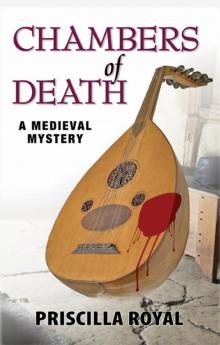 Chambers of Death mm-6
Chambers of Death mm-6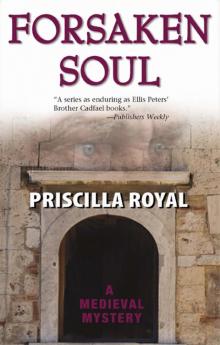 Forsaken Soul
Forsaken Soul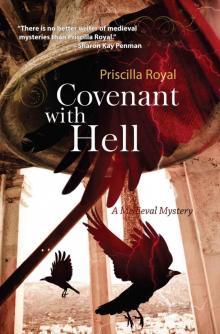 Covenant With Hell (Medieval Mysteries)
Covenant With Hell (Medieval Mysteries)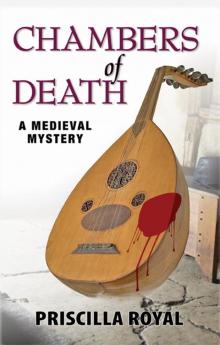 Chambers of Death
Chambers of Death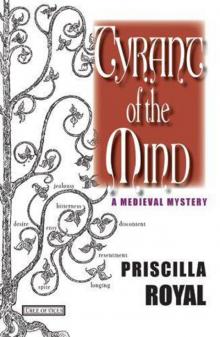 Tyrant of the Mind
Tyrant of the Mind Wild Justice
Wild Justice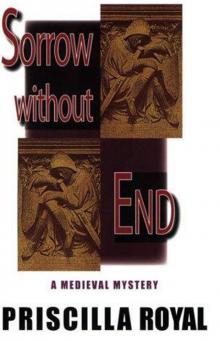 Sorrow Without End
Sorrow Without End Wine of Violence
Wine of Violence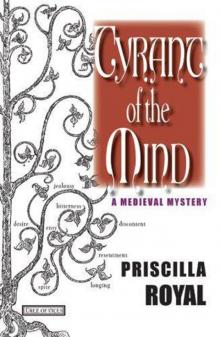 Tyrant of the Mind mm-2
Tyrant of the Mind mm-2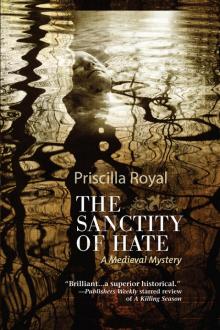 The Sanctity of Hate
The Sanctity of Hate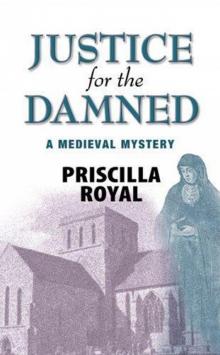 Justice for the Damned
Justice for the Damned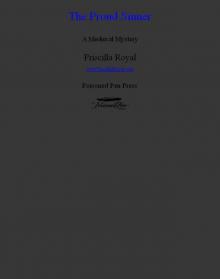 The Proud Sinner
The Proud Sinner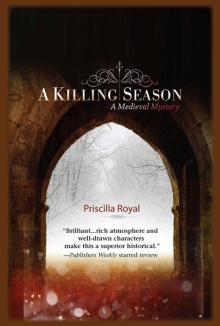 A Killing Season mm-8
A Killing Season mm-8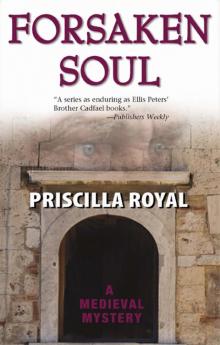 Forsaken Soul mm-5
Forsaken Soul mm-5 Valley of Dry Bones mm-7
Valley of Dry Bones mm-7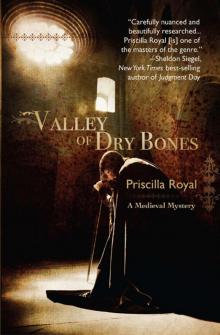 Valley of Dry Bones
Valley of Dry Bones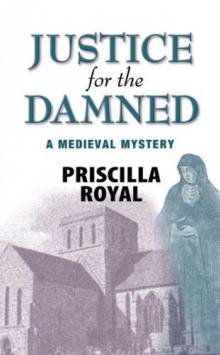 Justice for the Damned mm-4
Justice for the Damned mm-4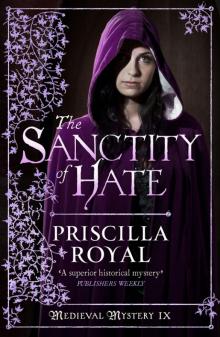 Sanctity of Hate
Sanctity of Hate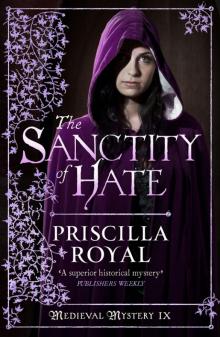 Sanctity of Hate mm-9
Sanctity of Hate mm-9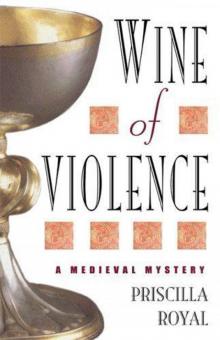 Wine of Violence mm-1
Wine of Violence mm-1